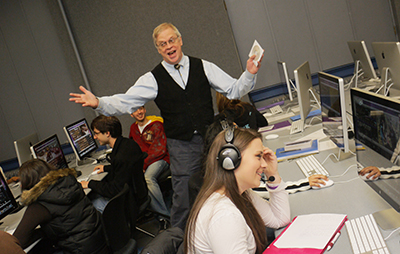Terrence Ross, an associate professor of communications, judges each class by how much the students teach him.
During his nearly 30 years at Adelphi University, Terrence Ross, an associate professor of communications in the College of Arts and Sciences, has eschewed the concept of the all-knowing professor lecturing to students.
“I judge each class by how much the students teach me,” Ross said. “I believe education should be a dialogue between professor and student—each should walk away enriched.”
Ross, who earned a bachelor’s degree in humanities at The New School for Social Research and a master’s degree in dramatic writing at New York University, finds it enriching when people share their personal histories, or those of their ancestors. In the summer of 2014, he visited Belize and met with the members of the Central American country’s indigenous Maya group.
“It was fascinating—they talked to me about their history going back five or six generations,” he said. “Belize has a diversity of people including Creoles, Caribbeans, Indians and the British.”
Genealogical research and online learning are subjects of particular interest to Ross. In 2013, he became chair of the New York State Senate advisory committee on online learning. He also serves as director of the SAY IT! project, in which public school students use technology and online resources in their research. He teaches a more advanced version of the project to his Adelphi students.
 “In my Basic Media Production course, I have my students do videos about their ancestors—they really get into it,” he said. “If a student is going to talk about their grandfather, they’re going to spend more time on the research.”
“In my Basic Media Production course, I have my students do videos about their ancestors—they really get into it,” he said. “If a student is going to talk about their grandfather, they’re going to spend more time on the research.”
Ross is involved in The Shared Roots Project, a social networking site devoted to ancestral research; it was created in part with funding from the University. In Spring 2015, he co-taught an Honors College seminar on the topic that included research on one of his own ancestors who lived during the 1910s. “That decade included the suffrage movement, the influenza epidemic and Prohibition,” he said.
During the seminar, Ross said students “examined that era from a variety of strands: Prohibition, jazz and popular dance, the suffragettes, racism through the career of Jack Johnson, architecture and immigration in New York City and the flu epidemic of 1918. All of these areas of study were enlivened for the students when they imagined their ancestor living and reacting to these issues.” He added, “That it was their own ancestor they were dealing with motivated them to do more personal and scholarly research.”
These Honors College students’ profiles can be found at the Shared Roots site under “Advanced Search,” then “Group,” then “Honors Class in Shared Roots 2015.”
For further information, please contact:
Todd Wilson
Strategic Communications Director
p – 516.237.8634
e – twilson@adelphi.edu